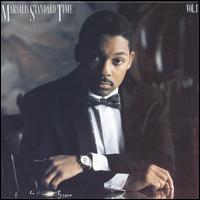Related Research Articles

Wynton Learson Marsalis is an American trumpeter, composer, teacher, and artistic director of Jazz at Lincoln Center. He has promoted classical and jazz music, often to young audiences. Marsalis has won at least nine Grammy Awards, and his Blood on the Fields was the first jazz composition to win the Pulitzer Prize for Music. He is the only musician to win a Grammy Award in jazz and classical during the same year.

Stanley Clarke is an American bassist, film composer and founding member of Return to Forever, one of the first jazz fusion bands. Clarke gave the bass guitar a prominence it lacked in jazz-related music. He is the first jazz-fusion bassist to headline tours, sell out shows worldwide and have recordings reach gold status.

Wayne Shorter is an American jazz saxophonist and composer. Shorter came to wide prominence in the late 1950s as a member of, and eventually primary composer for, Art Blakey's Jazz Messengers. In the 1960s, he went on to join Miles Davis's Second Great Quintet, and from there he co-founded the jazz fusion band Weather Report. He has recorded over 20 albums as a bandleader.

Pauline Kael was an American film critic who wrote for The New Yorker magazine from 1968 to 1991. Kael was known for her "witty, biting, highly opinionated and sharply focused" reviews, her opinions often contrary to those of her contemporaries. She was one of the most influential American film critics of her era.

Nathan Irving Hentoff was an American historian, novelist, jazz and country music critic, and syndicated columnist for United Media. Hentoff was a columnist for The Village Voice from 1958 to 2009. Following his departure from The Village Voice, Hentoff became a senior fellow at the Cato Institute and continued writing his music column for The Wall Street Journal, which published his works until his death. He often wrote on First Amendment issues, vigorously defending the freedom of the press.

Clifton Chenier, a Louisiana French-speaking native of Leonville, Louisiana, near Opelousas, was an eminent performer and recording artist of zydeco, which arose from Cajun and Creole music, with R&B, jazz, and blues influences. He played the accordion and won a Grammy Award in 1983.

Stanley Lawrence Crouch was an American poet, music and cultural critic, syndicated columnist, novelist, and biographer. He was known for his jazz criticism and his 2000 novel Don't the Moon Look Lonesome?
Ashley Kahn is an American music historian, journalist, and producer. Kahn graduated from Columbia University in 1983.
Renata Adler is an American author, journalist, and film critic. Adler was a staff writer-reporter for The New Yorker, and in 1968–69, she served as chief film critic for The New York Times. She is also a writer of fiction.
David Edelstein is the chief film critic for New York magazine and CBS Sunday Morning. He lives in Brooklyn, New York, with his wife and two daughters.

Henry "Mule" Townsend was an American blues singer, guitarist and pianist.
James W. Newton is an American jazz and classical flutist.
The National Society of Film Critics (NSFC) is an American film critic organization. The organization is known for its highbrow tastes, and its annual awards are one of the most prestigious film critics awards in the United States. As of January 2014 the NSFC have approximately 60 members who write for a variety of weekly and daily newspapers along with major publications and media outlets.
William Procter Matthews III was an American poet and essayist.

Leonard Geoffrey Feather was a British-born jazz pianist, composer, and producer, who was best known for his music journalism and other writing.
Stanley Frank Dance was a British jazz writer, business manager, record producer, and historian of the Swing era. He was personally close to Duke Ellington over a long period, as well as many other musicians; because of this friendship Dance was in a position to write "official" biographies. Over his career, his priority was advocating for the music of black ensembles performing sophisticated arrangements, based on Swing-era dance music.
Afterglow: A Last Conversation with Pauline Kael (2003) is among the last publicly available materials to gather film critic Pauline Kael's thoughts on the movie medium, prior to her death on September 3, 2001. The book was prepared by jazz critic Francis Davis.

Darcy James Argue is a jazz composer and bandleader known for his work with his 18-piece ensemble, Secret Society.

Marsalis Standard Time, Vol. 1 is an album by jazz trumpeter Wynton Marsalis that was released in 1987. It won the Grammy Award for Best Jazz Instrumental Performance, Group in 1988.
Mark Kendall is an American artist and filmmaker. He was a 2014 Guggenheim Fellow, a 2015 MacDowell Colony Fellow, and the recipient of a 2016 Pew Fellowship in the Arts.
References
- ↑ Report of the President and of the Treasurer (John Simon Guggenheim Memorial Foundation, 1994), p. 54.
- ↑ Report of the President and of the Treasurer, p. 54.
- ↑ Stanley Crouch, "Putting the White Man In Charge Archived 2016-05-07 at the Wayback Machine ", April 2003, Jazz Times.
- ↑ Daniel King, "Hanging the Judge - Crouch, Jazz & the All-American Skin Game", May 13, 2003, Village Voice.